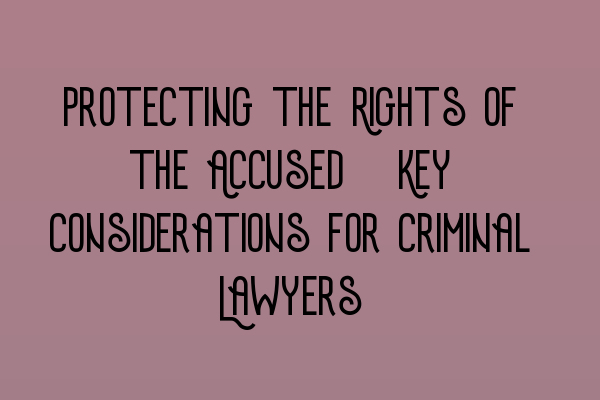Protecting the Rights of the Accused: Key Considerations for Criminal Lawyers
When it comes to criminal law, one of the most important roles of a lawyer is to protect the rights of the accused. The criminal justice system can be complex and intimidating, and without proper representation, defendants may find themselves at a significant disadvantage. In this blog post, we will explore the key considerations for criminal lawyers in protecting the rights of their clients.
The Presumption of Innocence
One of the fundamental principles of criminal law is the presumption of innocence. It is the duty of the criminal lawyer to ensure that this principle is upheld throughout the legal process. This means that the lawyer must advocate for their client’s innocence until it is proven otherwise beyond a reasonable doubt. By providing a vigorous defense and challenging the prosecution’s evidence, a criminal lawyer plays a crucial role in safeguarding the rights of the accused.
Related Article: Legal Representation for Delaware LLCs in the UK: Expert Advice
Effective Communication and Confidentiality
In order to provide effective representation, a criminal lawyer must establish open lines of communication with their client. This involves actively listening to the client’s concerns, gathering all relevant information, and explaining the legal process in a clear and understandable manner. Furthermore, maintaining client confidentiality is of utmost importance. By ensuring that conversations and information shared with the lawyer remain private, the rights of the accused are protected.
Thorough Investigation
Another key consideration for criminal lawyers is conducting a thorough investigation. This includes examining the evidence, interviewing witnesses, and exploring any potential defenses or mitigating factors. By carefully analyzing the facts of the case, a lawyer can identify any weaknesses in the prosecution’s case and build a strong defense strategy to protect their client’s rights.
Related Articles: Legal Challenges for UK Businesses in the U.S.: Strategies for Overcoming Hurdles, Legal Challenges for UK Businesses in the U.S.: Strategies for Overcoming Hurdles
Fair Trial and Due Process
Ensuring a fair trial and due process is another vital aspect of protecting the rights of the accused. A criminal lawyer must be well-versed in the rules of evidence and procedure, and they must vigorously challenge any violations of their client’s rights. This may include filing motions to suppress evidence, objecting to improper questioning or argumentation, and advocating for the exclusion of any illegally obtained evidence. By adhering to the principles of a fair trial, a criminal lawyer plays a critical role in safeguarding the rights of the accused.
Professional Ethics
Professional ethics are integral to the practice of criminal law. It is the duty of a criminal lawyer to maintain the highest ethical standards while representing their clients. This includes avoiding conflicts of interest, preserving client confidentiality, and ensuring that all actions are in the best interests of the client. By adhering to professional ethics, criminal lawyers uphold the integrity of the legal profession and safeguard the rights of their clients.
Related Articles: SQE Exam Prep: Essential Study Materials for Aspiring Solicitors, Expert Testimonies in UK Courts: Building Strong Cases
Conclusion
Protecting the rights of the accused is a paramount duty for criminal lawyers. By upholding the presumption of innocence, maintaining effective communication and confidentiality, conducting thorough investigations, ensuring a fair trial and due process, and adhering to professional ethics, lawyers can play a crucial role in safeguarding the rights of their clients. It is through the dedicated efforts of these legal professionals that defendants have a fighting chance in the criminal justice system.
